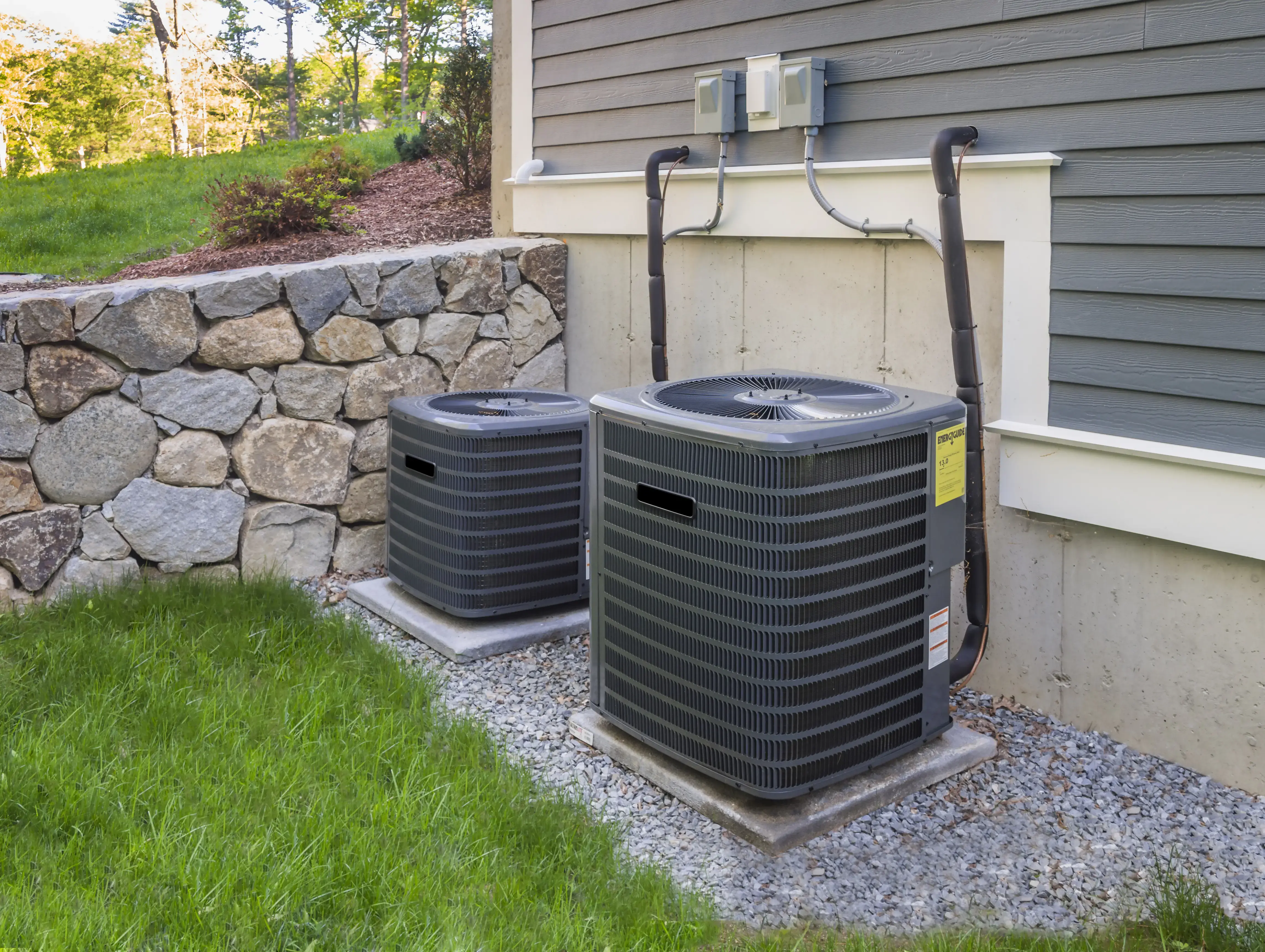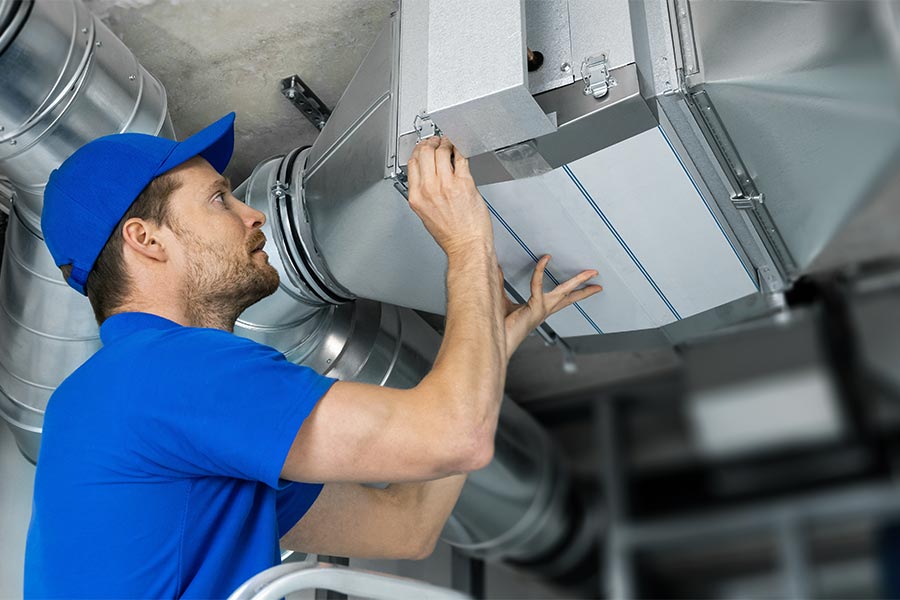Discovering the Important Parts of an Effective HVAC System
A reliable a/c system is developed on a number of vital elements that operate in consistency. Each part, from the thermostat to the ductwork, plays a necessary function in maintaining convenience and energy performance. Comprehending these components is important for maximizing efficiency and boosting indoor air quality. As one checks out these components, the elaborate relationships in between them reveal insights into improving total system performance. What details aspects contribute most to this effectiveness?
The Duty of the Thermostat in HVAC Effectiveness

Although typically forgotten, the thermostat plays a vital function in the efficiency of a/c systems. HVAC experts. This tiny tool acts as the primary nerve center, regulating temperature level setups and making certain perfect convenience within a room. By properly sensing the ambient temperature level, the thermostat interacts with the heating, air flow, and air conditioning units to keep the wanted environment
A reliable thermostat lessens energy intake by turning on the HVAC system just when required, consequently stopping extreme heating or air conditioning. Modern clever and programmable thermostats improve this effectiveness better by allowing customers to set schedules and from another location adjust settings, adjusting to everyday routines.
Furthermore, the positioning of the thermostat is crucial; inappropriate place can bring about imprecise temperature readings, causing inefficient operation. Generally, a well-functioning thermostat not only boosts comfort yet likewise contributes markedly to power financial savings and the longevity of the HVAC system.
Recognizing the Value of Air Filters
Air filters offer an essential feature in cooling and heating systems by assuring that the air circulating within a room remains healthy and tidy. These filters catch dirt, allergens, and various other toxins, avoiding them from being recirculated throughout the atmosphere. By capturing these fragments, air filters add to boosted interior air top quality, which can significantly profit owners' health, especially those with allergies or breathing conditions.
Furthermore, preserving tidy air filters boosts the performance of HVAC systems. Clogged filters can limit air movement, creating the system to work harder to preserve wanted temperature levels, causing enhanced energy consumption and greater utility expenses. Consistently replacing or cleaning filters is a crucial maintenance step that can lengthen the lifespan of cooling and heating equipment. Eventually, understanding the significance of air filters allows house owners and structure managers to take proactive steps to guarantee a well-functioning, reliable a/c system that promotes a safe and comfortable interior setting.

The Capability of the Heating System and Warm Pump
Heaters and heatpump are vital components of HVAC systems, in charge of offering heat during colder months. Heating systems operate by home heating air through burning or electrical resistance, then dispersing it throughout the home using ducts. They commonly use rapid heating and can be fueled by natural gas, electrical power, or oil, relying on the system type.
Conversely, heat pumps transfer warmth instead of create it. They draw out warmth from the outdoors air or ground, even in reduced temperature levels, and move it indoors. HVAC experts. This twin capability permits heatpump to likewise give cooling in warmer months, making them functional alternatives for year-round environment control
Both systems require correct upkeep to ensure effectiveness and long life. While furnaces excel in extreme chilly, warmth pumps can be useful in moderate environments. Comprehending their unique functionalities help homeowners in choosing one of the most ideal option for their home heating requires.
Checking Out the Air Conditioning System
The cooling device is an important element of HVAC systems, readily available in numerous types to suit various requirements. Recognizing the efficiency ratings of these units is necessary for making informed options concerning energy usage and price. This area will check out the varied types of ac system and clear up exactly how efficiency rankings impact performance.
Kinds Of Air Conditioners
While numerous variables affect the option of a/c systems, recognizing the different types offered is crucial for house owners and building managers alike. Central air conditioning conditioners are designed to cool down entire homes or structures, using a network of air ducts for air flow. Home window units use an even more local service, suitable for solitary areas or small spaces. Portable air conditioning system provide flexibility, enabling customers to move the system as required. Ductless mini-split systems are another option, combining the performance of central systems with the convenience of zoning, as they need no ductwork. Lastly, geothermal systems harness the planet's temperature level for energy-efficient cooling. Each type includes distinctive benefits, making educated choices necessary for efficient climate control.

Performance Rankings Described
Recognizing effectiveness ratings is vital for picking the right a/c unit, as these metrics offer insight into the system's performance and power intake. One of the most typical rating for ac unit is the Seasonal Energy Performance Ratio (SEER), which gauges the cooling result throughout a regular cooling season separated by the total electrical power input. A greater SEER suggests much better performance. Additionally, the Energy Performance Proportion (EER) is used for measuring effectiveness under details problems. One more vital metric is the Energy Star qualification, which represents that a system fulfills stringent energy effectiveness guidelines. By assessing these ratings, customers can make enlightened choices that not just maximize comfort however also minimize energy prices and environmental influence.
The Significance of Ductwork and Air movement
Efficient ductwork style and air movement management play essential roles in the total efficiency and performance of a/c systems. Correct ductwork warranties that conditioned air is dispersed uniformly throughout a room, lessening temperature changes and improving comfort. Well-designed air ducts decrease resistance to airflow, decreasing the work on a/c tools and ultimately decreasing power intake.
Air movement administration involves tactically placing vents and registers to improve the flow of air. This prevents typical concerns such as cool or hot spots, which can occur when airflow is obstructed or improperly balanced. Additionally, the ideal duct materials and insulation can further enhance effectiveness by minimizing heat loss or gain during air transportation.
A reliable ductwork system not only adds to energy cost savings but can also prolong the lifespan of a/c equipment by decreasing unneeded stress (HVAC experts). Understanding the relevance of ductwork and air movement is crucial for accomplishing peak A/c system efficiency.
Regular Upkeep Practices to Enhance Performance
Routine upkeep methods are vital for ensuring peak efficiency of HVAC systems. These techniques consist of regular assessments, cleaning, and necessary repair work to keep the system running successfully. Frequently changing air filters is crucial, as blocked filters can obstruct air movement and reduce efficiency. In enhancement, professionals need to check and clean evaporator and condenser coils to stop overheating and energy wastefulness.
Yearly specialist examinations are also recommended, as qualified specialists can identify prospective concerns prior to they rise. Lubricating moving components lessens damage, contributing to a much longer life-span for the system. Furthermore, ensuring that the thermostat works appropriately help in maintaining excellent temperature level control.

Frequently Asked Questions
How Usually Should I Replace My Thermostat?
Thermostats should usually be replaced every 5 to 10 years, depending on use and innovation innovations. Routine checks are recommended to guarantee peak efficiency, particularly if experiencing inconsistent temperature control or increased power expenses.
What Size Air Filter Is Best for My Cooling And Heating System?
The most effective size air filter for HVAC experts a heating and cooling system varies by unit style. Generally, it's crucial to get in touch with the proprietor's guidebook or examine the existing filter dimensions to guarantee peak efficiency and air high quality.
Can I Install a Heatpump Myself?
Setting up a heatpump separately is feasible for knowledgeable individuals, but it needs knowledge of electrical systems and neighborhood codes. Employing a professional is advised to guarantee correct setup and ideal system performance.
How Do I Know if My Ductwork Is Effective?
To identify ductwork efficiency, one must inspect for leakages, procedure air movement at vents, inspect insulation high quality, and review temperature differences between supply and return ducts. Specialist analyses can offer complete insights right into general efficiency.
What Are Signs My Cooling And Heating Demands Immediate Upkeep?
Signs that an a/c system requires immediate upkeep consist of uncommon sounds, irregular temperature levels, raised energy expenses, unpleasant odors, and constant cycling. Attending to these problems immediately can prevent more damage and guarantee top system performance.
Air filters serve an essential feature in HVAC systems by ensuring that the air flowing within a space stays clean and healthy and balanced. Furthermore, keeping tidy air filters boosts the effectiveness of Heating and cooling systems. Ductless mini-split systems are an additional alternative, combining the performance of central systems with the ease of zoning, as they require no ductwork. Comprehending efficiency rankings is crucial for choosing the best air conditioning system, as these metrics offer understanding right into the system's efficiency and energy usage. The finest dimension air filter for a Heating and cooling system varies by unit style.